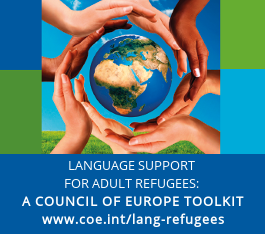Launch Conference
Launch of the Council of Europe Toolkit providing Language Support for Adult Refugees
Strasbourg, 22-23 November 2017
Programme of the launch conference including presentations (also available in French)
NB Speakers’ presentations are available in the original language.
SUMMARY
Council of Europe responsiveness to societal needs
The Council of Europe has prepared an online toolkit to offer practical support to organisations providing linguistic assistance for adult refugee, for it is essential to enable refugees to learn to communicate in the host society as quickly as possible. The toolkit fulfils this need by facilitating initial exchanges, in emergency situations and subsequently initiating refugees in the language of the host country.
The online toolkit comprises 57 tools and a set of resource materials (www.coe.int/lang-refugees) proposed in seven languages: German, English, French, Greek, Italian, Dutch and Turkish.
A wide range of participants attend the launching of the toolkit
Over one hundred participants from 23 countries – including those most concerned by the reception of refugees – responded to the Council of Europe’s invitation to the launching of the toolkit in Strasbourg. Some 70 entities were represented: associations, organisations – both regional and national – but also major international networks and representatives of ministries of and national institutions. These participants greatly welcomed this free, flexible, and user-friendly toolkit and were given the opportunity to put forward useful suggestions for its improvement.
An array of speakers
The conference programme involved not only the Council of Europe and four major international organisations but also a Bosnian writer, who was a political refugee in France; he gave a moving account of his experience of integration: “integration must be a coming together of refugees and the remainder of the population”. The Council of Europe toolkit is aimed precisely at creating a bridge between refugees and the host society.
Matthew Johnson, Director of Democratic Citizenship and Participation, explained that the toolkit “serves as an example of how needs are first identified, appropriate responses developed and then offered to member states and key players/stakeholders” for implementation. Villano Qiriazi, Head of the Education Policy Division, said that the development of the toolkit was part of a long tradition of language policies and that it was based on the resources and the outcome of six decades of work. Finally Etienne Gilliard, Chair of the Steering Committee for Educational Policy and Practice (comprising representatives of the 47 member states) emphasised the “spirit of solidarity and compassion” underlying the design of the toolkit.
Tomáš Boček, Special Representative of the Secretary General to the Council of Europe on Migration and Refugees, thought that “language is a key that opens many doors” and that the toolkit was an excellent example of a simple and practical solution that could be easily used in a number of member states, as its potential could materially improve opportunities for learning the language(s) of the host country”. He also pointed out that “the very clear structure of the toolkit and the numerous examples it offered provided volunteers with resources enabling them to understand refugees’ needs, plan their support and offer effective linguistic assistance”.
Ambassador Erdoğan Işcan (Chairman of the GR-C / Committee of Ministers) recalled that “the Council of Europe is already active in this field through the larger project on Linguistic Integration of Adult Migrants (LIAM). This project offers support to policy makers and practitioners who are working to facilitate migrants’ integration into civil society. With the new toolkit we are introducing today, the Council of Europe takes a further initiative to facilitate social cohesion and enhance the dignity of refugees. It offers them a way of becoming autonomous by getting means to learn the language of the host country.”
The four international organisations who had agreed to contribute to the launching welcomed the creation of the Council of Europe toolkit as the first toolkit of its kind.
Céline Peroni (European Commission) thought that it provided “real practical solutions” to the problems she encountered in some of the projects for which she was responsible. In the view of Myriam Mwizerwa (International Organization for Migration - IOM) “the ability to communicate gives people a feeling of responsibility and of being able to cope in their everyday lives” (which is precisely the objective of the toolkit). Gert Westerveen said that the High Commissioner for the United Nations (UNHCR) greatly appreciated the toolkit devised by the Council of Europe Language Policy Programme. Finally Cécile Thoreau welcomed the toolkit and said that her work at the Organisation for Economic Co-operation and Development (OECD) was complementary to that being done at the Council of Europe.
After the launch: what next?
Not only the representatives of the international organisations present but also a large number of participants said that they intended to make an active contribution to the dissemination of the toolkit, which is actually a website (www.coe.int/lang-refugees) available in seven languages and comprising 57 tools and a whole range of other resources which are useful to both volunteers and bodies offering language support.
List of organisations which took part in the launching conference (pdf)



